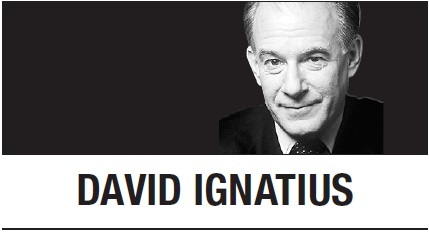[David Ignatius] America needs to use power silently
By David IgnatiusPublished : Dec. 2, 2018 - 17:13
 Listen to the voice barking orders on a Russian ship last Sunday as it drove straight toward a Ukrainian tug: “Crush him from the right. ... Do it! Do it! (Expletive) cut him off!” And then, just before the deliberate collision, a satisfied: “Hold on, everyone.”
Listen to the voice barking orders on a Russian ship last Sunday as it drove straight toward a Ukrainian tug: “Crush him from the right. ... Do it! Do it! (Expletive) cut him off!” And then, just before the deliberate collision, a satisfied: “Hold on, everyone.” What you sense is the raw exuberance of Russian power, in the audio and video recordings released by the Ukrainian interior minister and posted on YouTube by BBC News. The Russian captain snarls obscene, bellicose orders to his crew -- clearly confident that he’s carrying out an operation approved by his superiors.
What happened Sunday in the international waters of the Black Sea was just one more chapter in President Vladimir Putin’s recurring, calculated show of strength. He dialed up the tension, seizing the tug and two other Ukrainian vessels and their 24 crew members in the Sea of Azov, off Crimea. Then, a few days later, after President Trump first threatened to cancel their meeting at the G-20 summit in Buenos Aires, Putin dialed down the rhetoric.
“This is a border incident, nothing more,” Putin said Wednesday. What really mattered, said Putin’s foreign policy adviser Yuri Ushakov, was the summit with Trump in Argentina.
Sorry, Vlad, but the rheostat didn’t work this time. Trump laudably scuttled the planned Buenos Aires session with Putin. “Based on the fact that the ships and sailors have not been returned to Ukraine from Russia, I have decided it would be best for all parties concerned to cancel my previously scheduled meeting,” Trump tweeted Thursday.
Trump may have concluded that this wasn’t the weekend to be palling around with Putin, with special counsel Robert Mueller focusing on the question of the Trump family’s possible financial involvement in Russia in 2016. But whatever the reason, it was the right call.
The Black Sea confrontation illustrates once again that Putin is a deft tactician -- trying to calibrate force as if he’s wielding a dentist’s drill -- but that he lacks a coherent strategy, other than his implicit plea: Take Russia seriously! Talk to me!
As Dmitri Trenin of the Carnegie Moscow Center wrote this week. “Like all Russian leaders, Putin wants a privileged relationship with the US president. Such a relationship shows off Russia’s status as a great power.” At bottom, Putin suffers from status anxiety.
What’s noteworthy is that most major global leaders seem to be adopting their own versions of Trump’s trademark style of seeking diplomatic gains through disruption.
It’s as if everyone is embracing the “madman theory” at once: Putin threatens war in the Black Sea; Trump cancels a US-Russian arms-control treaty and then nixes the Argentina summit meeting; Turkish President Recep Tayyip Erdogan says he’s buying US fighter jets and a Russian air-defense system, simultaneously, NATO be damned; Saudi Arabia’s crown prince claims he had nothing to do with a murder organized by his bodyguard and chief media adviser, and flies to Argentina as if nothing had happened.
Our heads are spinning from all the macho power plays. But there’s an important question lurking here: Is there any major leader among this gang of disrupters who can actually make a deal, as opposed to posturing for one?
The calmest voices lately have been the Chinese, as they glide into the vacuum left by Trump as he embraced “America First” and abandoned leadership of the global order. China’s approach, of course, is to win wars without fighting, as enunciated 2,500 years ago by master strategist Sun Tzu. Beijing doesn’t ram boats or buzz aircraft carriers in the South China Sea; the Chinese slowly turn reefs into islands, and then fortify them into airbases. By the time people see what’s happening, it’s too late. Their answer to disruption is stealth.
Commentators often argue that America should penalize Putin’s aggression by matching his tough tactics. “NATO should look at increasing naval patrols in the Black Sea,” argued Amb. John Herbst, former US ambassador to Ukraine, in an Atlantic Council briefing last week. But I’d tend to agree with Mark Galeotti, a British Kremlin-watcher, who tweeted, “Calls for Western naval forces to be sent into Azov (are) dangerous, impractical, illegal.”
Far better than tit-for-tat American bluster and belligerence would be quiet, hard-nosed use of power. Make Russia pay a price for aggression, but invisibly. Pressure Saudi Arabia’s crown prince to stabilize his regime and stop the fighting in Yemen, but silently.
Take a chapter from the Chinese playbook, in other words. America is a more credible superpower when it makes less noise.
David Ignatius
David Ignatius can be reached via Twitter: @IgnatiusPost. -- Ed.
(Washington Post Writers Group)








![[Graphic News] More Koreans say they plan long-distance trips this year](http://res.heraldm.com/phpwas/restmb_idxmake.php?idx=644&simg=/content/image/2024/04/17/20240417050828_0.gif&u=)
![[KH Explains] Hyundai's full hybrid edge to pay off amid slow transition to pure EVs](http://res.heraldm.com/phpwas/restmb_idxmake.php?idx=644&simg=/content/image/2024/04/18/20240418050645_0.jpg&u=20240419100350)





![[From the Scene] Monks, Buddhists hail return of remains of Buddhas](http://res.heraldm.com/phpwas/restmb_idxmake.php?idx=652&simg=/content/image/2024/04/19/20240419050617_0.jpg&u=20240419175937)

![[KH Explains] Hyundai's full hybrid edge to pay off amid slow transition to pure EVs](http://res.heraldm.com/phpwas/restmb_idxmake.php?idx=652&simg=/content/image/2024/04/18/20240418050645_0.jpg&u=20240419100350)

![[Today’s K-pop] Illit drops debut single remix](http://res.heraldm.com/phpwas/restmb_idxmake.php?idx=642&simg=/content/image/2024/04/19/20240419050612_0.jpg&u=)